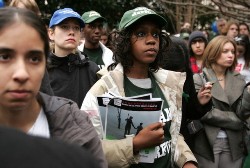Darfur advocacy groups not surprised by suspension of US-Sudan talks
By Wasil Ali
June 3, 2008 (WASHINGTON) – The Darfur advocacy groups in the US have expressed little surprise over the abrupt suspension of normalization talks between Washington and Khartoum.

talks “were ill-fated because the U.S. approached them without any leverage”.
“U.S. Defense Secretary Gates himself has said that it make sense to pursue negotiations only when you have built some leverage” he added.
Professor Eric Reeves, Smith College English professor and Sudan expert, echoed the same call saying “it is hardly surprising that he [Williamson] found it impossible to make progress in normalizing relations with Khartoum’s genocidaires”.
The US special envoy told reporters in Khartoum today that dialogue with the Sudanese government on bilateral ties will be halted after failing to broker an agreement between the ruling National Congress Party (NCP) and Sudan People Liberation Movement (SPLM) over the oil rich region of Abyei.
“Until they want a meaningful peace, there is nothing the United States or others can do. I’ve tried my best and I leave sad and disappointed,” he said following days of talks on how to resolve a crisis in Sudan’s Abyei district.
“Right now our talks are suspended,” he added.
Professor Reeves accused the Sudanese government of “deliberately and systematically” escalating military tensions in the area.
“Khartoum continues to renege on key terms of the Comprehensive Peace Agreement (CPA), including accepting the binding arbitration of the Abyei issue reflected in the July 2005 report of the distinguished Abyei Boundary Commission (ABC)” he said.
The ‘Save Darfur’ coalition issued a statement attributed to its president Jerry Fowler, saying that the decision by the US to suspend the talks “must not be an end to robust U.S. engagement to resolve the crises in Abyei and Darfur – neither of which can be solved in isolation from the other”
“The United States must use its presidency of the U.N. Security Council (UNSC) this month to impose real consequences on those individuals who impede peace or order attacks on civilians” Fowler added.
But Williamson told a group of activists in a conference call last month that the US “has no game plan” during its presidency of the UNSC.
Prendergast blamed the lack of US leadership in the UNSC to pressure Sudan and said that the outcome was “no one took the talks seriously, especially within the Sudan government”
News of negotiations between the US and Sudan sparked outrage among Darfur advocacy and lawmakers when the details of the talks emerged in a report by the New York Times (NYT). The documents were leaked by an unidentified US official described as being “critical of the administration’s position”.
The report said that the Bush administration could remove Sudan from an American list of state supporters of terrorism and normalize relations if the Sudanese government agreed, among other steps, to allow Thai and Nepalese peacekeepers as part of the peacekeeping force.
But Williamson defended the talks and assured US lawmakers and Darfur advocates that “concrete, verifiable, significant progress must be achieved on the ground before we can contemplate improved relations”.
He further said that tougher sanctions remain an option on the table if the US president Bush deems them necessary.
Professor Reeves voiced support for coercive measure against the Sudanese government.
“Moral equivalence between Khartoum and the SPLA/M, between Khartoum and the Darfur rebels, between Khartoum and other marginalized populations in Sudan, has bedeviled all diplomatic efforts to end the NIF’s [National Islamic Front] genocidal domestic security and military policies” he said.
“Until the regime is recognized for what it is, and pressured accordingly, peace will not come to Sudan” he added.
(ST)
